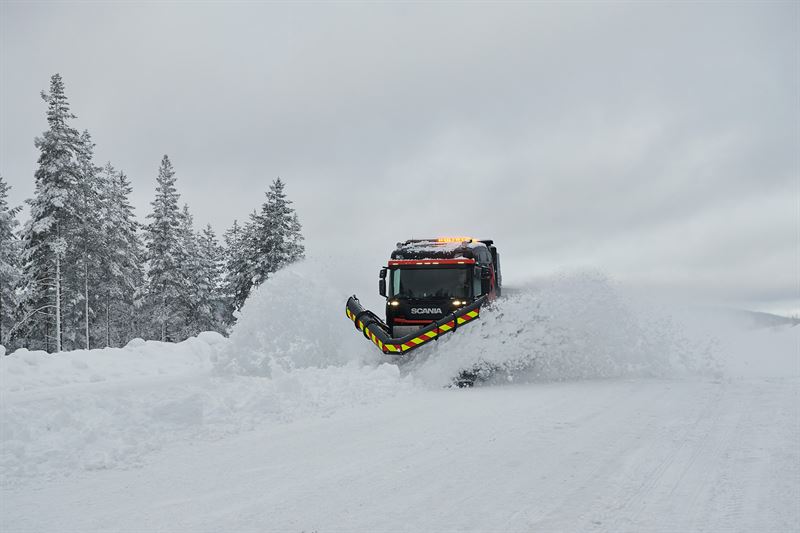Scania Year-end Report January-December 2019

2019 was a year of continued growth and many records for Scania. Vehicle deliveries reached historically high levels as did service volume.
Summary of the full year 2019
- To fight climate change, Scania is setting Science Based Targets in line with limiting global warming to 1.5°C
- Net sales increased by 11 percent to SEK 152,419 m. (137,126)
- Operating income increased by 26 percent to SEK 17,488 m. (13,832)
- Cash flow amounted to SEK 10,994 m. (3,718) in Vehicles and Services
Comments by Henrik Henriksson, President and CEO
“2019 was a year of continued growth and many records for Scania. Vehicle deliveries reached historically high levels as did service volume. Net sales amounted to record high SEK 152.4 billion, 11 percent up from previous year. Earnings were the highest ever at SEK 17,488 m., and operating margin 11.5 percent. Higher vehicle and service volume, currency effects and market mix contributed positively. Service revenue increased by 9 percent to SEK 28.9 billion. Operating income for Financial Services was a record high SEK 1,511 million.
Total order bookings for trucks and buses and coaches fell by 9 percent in 2019 compared to 2018. Demand for trucks in Europe slowed in the second half of 2019 due to a weakening economic cycle. In Latin America, Brazil’s recovery is progressing slowly. In Eurasia and Asia demand is impacted by political and trade-related concerns. For buses and coaches orders decreased in most regions. Scania managed to partly compensate the demand drop in the Middle East. Order intake in Engines was good, despite strong comparative figures 2018.
Adjustments of structural costs to lower volume is on-going and we are continuously reviewing staffing and consultant assignments for projects. It is a necessity for Scania to continue making large-scale investments in new technologies to help drive the shift towards sustainable transport.
To succeed in the transition to a fossil-free transport system, biofuels are crucial. In 2019, Scania increased sales of vehicles that run on alternatives to diesel by 46 percent (6,631 vehicles). There is great potential for wider use of biofuels as all Scania vehicles can run on biodiesel-HVO. Biofuels are available right now, while it is taking time for new technology to impact reduction of carbon emissions. In parallel with scaling up use of biofuels, Scania needs to invest in new technology and infrastructure for a gradual changeover to electrification.
In the electrification of heavy vehicles, there is no silver bullet but Scania is developing several technologies, often with customers. One technology track developed with grocery wholesaler ASKO is fuel cell electric trucks powered by hydrogen gas. The trucks recently entered into operation in Trondheim, Norway where ASKO opened a hydrogen gas station. In addition, Scania’s fully electric battery-powered trucks for city distribution were installed in the customer’s Oslo operations.
To reduce greenhouse gases at the rate and extent recommended by science, Scania is setting Science Based Targets in line with limiting global warming to 1.5°C. Scania thereby not only commits to reducing its own emissions, but also to achieving reductions where the main CO2 emissions occur – when the products are used.
The full impact on Scania due to the outbreak of the Coronavirus is not currently possible to predict, given the uncertainty of the situation. We are following developments day-by-day and keep a tight dialogue with our customers, suppliers, union representatives and other partners.”
Contact persons
Susanna Berlin
Investor Relations
Tel. +46 8 553 861 12
Mobile tel. +46 70 086 05 02
Karin Hallstan
Head of Corporate Communications and PR
Tel. +46 8 553 852 10
Mobile tel. +46 76 842 81 04
Scania is a world-leading provider of transport solutions. Together with our partners and customers we are driving the shift towards a sustainable transport system. In 2019, we delivered 91,700 trucks, 7,800 buses as well as 10,200 industrial and marine engines to our customers. Net sales totalled to over SEK 152 billion, of which about 20 percent were services-related. Founded in 1891, Scania now operates in more than 100 countries and employs some 51,000 people. Research and development are concentrated in Sweden, with branches in Brazil and India. Production takes place in Europe, Latin America and Asia, with regional production centres in Africa, Asia and Eurasia. Scania is part of TRATON SE. For more information visit: www.scania.com.
Tags:


